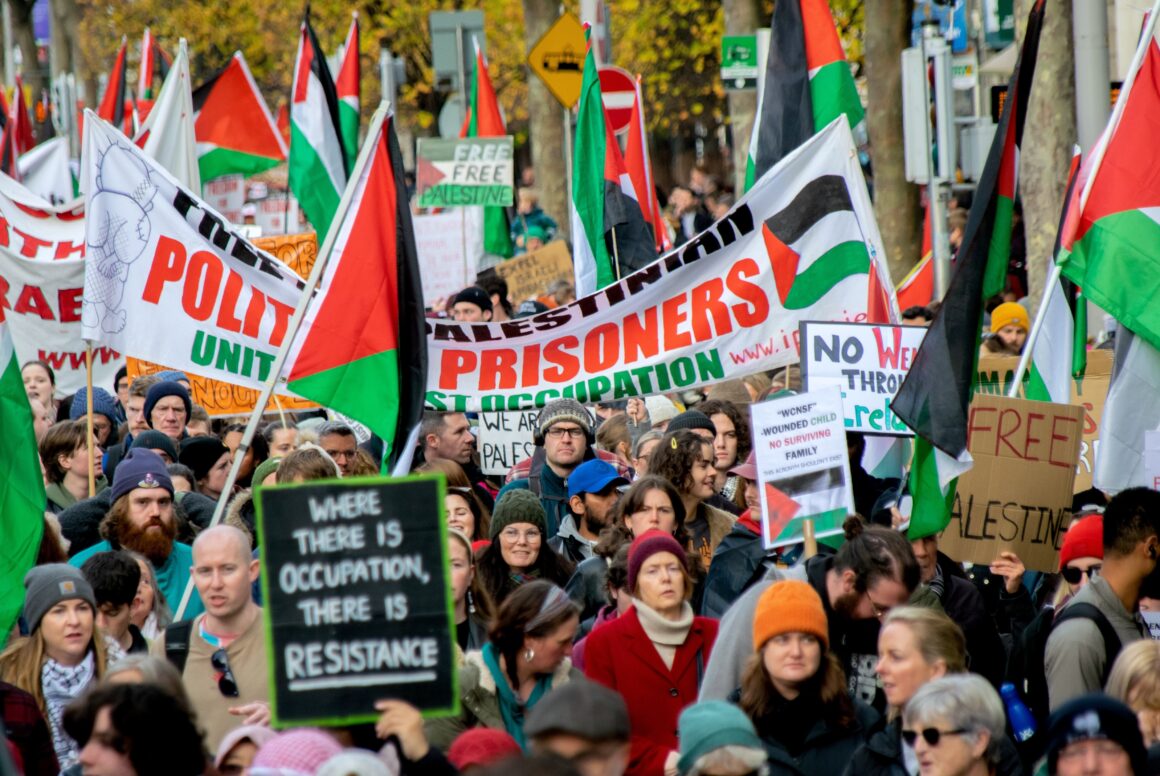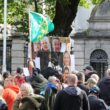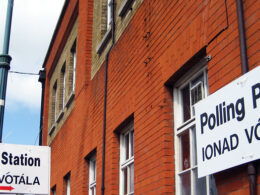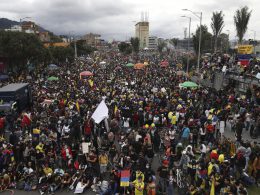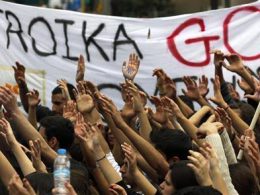Editorial from the upcoming issue of Socialist Alternative, the Marxist journal of the Socialist Party.
At the time of writing, the Israeli State’s genocidal war on Gaza is in its sixth week. The unspeakable horror being perpetrated in full view of the world, with the depraved backing of the Western imperialist powers – the US, EU and UK – has provoked shock and revulsion globally. The 2.3 million impoverished Palestinians of this small strip of land, parts of which are the most densely populated in the world, are unable to flee from the Israeli military’s murderous assault – which followed the brutal, surprise attack by Hamas on 7 October that left 1,200, mainly Israeli civilians, dead.
Since then, at least 11,000 Gazans have been massacred, including over 4,500 children (more than the annual number of children killed in all conflict zones since 2019), with over 25,000 wounded and thousands more buried under rubble. This is more than four times greater than Operation Protective Edge in the summer of 2014, when, over 50 days, 2,200 Palestinians in Gaza were killed. Without a doubt, this new barbaric onslaught is unprecedented in its scale and scope.
Along with the aerial bombardment and ground invasion, the tightening of the noose with the ‘total’ blockade of Gaza – with only a small trickle of food, fuel, clean water, and medicine getting in after three weeks of barely anything – is immeasurably compounding an existing humanitarian disaster. Already food riots have taken place, with thousands on the verge of starvation. Epidemics and water-borne diseases are now a particularly acute threat. An estimated 1.4 million have fled their homes, taking shelter in schools, hospitals, mosques and makeshift camps. But nowhere is safe from the bombs that rain down on the Strip.
Despicable rhetoric
The litany of war crimes being carried out are combined with racist, Islamophobic and dehumanising rhetoric from the Netanyahu government and Israeli state officials. When callously deciding to cut off all aid to Gaza, Israeli Minister for Defence Yoav Gallant declared: “We are fighting human animals, and we act accordingly.” Another member of the Knesset and Likud (Netanyahu’s ruling party), Ariel Kallner, called for: “A Nakba that will overshadow the Nakba of ‘48”. Defending the collective punishment being meted out in Gaza, Israeli President Isaac Herzog said:
“We are working, operating militarily according to rules of International Law. Period, unequivocally. It is an entire nation out there that is responsible. It is not true this rhetoric about civilians not being aware, not involved. It’s absolutely not true.”
Everyone in Gaza, by this sinister logic, is a legitimate target – notwithstanding half of the population being children or that Hamas numbers around 30,000 militants. The Israeli State’s backers have joined the fray in this genocidal language. Max Miller, a Republican House Representative in the US, said that Gaza should be “turned into a parking lot”. Senior Republican Senator Lindsey Graham said, “We are fighting a religious war, and I am on Israel’s side. Israel needs to do whatever it takes, raze this place to the ground.”
The Netanyahu government is determined to exploit the shock and trauma produced by the Hamas attack within Israeli society. It will also use the carte blanche cynically afforded to it by its Western allies to pursue its aim of ethnically cleansing more Palestinian territory. There’s no limit to the devastation it may wreak on all Palestinians while it feels it can get away with it.
Mass mobilisations against Israeli State terror
In response, a global movement in solidarity with Palestinians has mushroomed in the last few weeks. Millions have taken to the streets of cities and towns across the world, accompanied by a mood that they will remain on the streets until the bloodshed is ended and that there can be no business as usual while the massacre of Gaza continues.
Especially large and militant mass protests have taken place across North Africa and the Middle East, which will be looked upon with trepidation by the dictatorial regimes of the Arab States. In Jordan, where half the population is of Palestinian descent, daily protests of thousands and tens of thousands have heard chants of “Open the borders” and “We walk to free Palestine, dead or alive”. In Egypt, protests of over one million people have flooded the streets of Cairo – storming Tahrir Square, the symbolic heart of the revolt that overthrew the regime of Hosni Mubarak in 2011. The slogans of that revolution, “Bread, Freedom and Social Justice”, have once again been heard.
Major protests and direct actions have occurred in the West. We’ve seen the largest pro-Palestinian demonstrations in British and US history, for example, which have been supplemented by significant occupations of Waterloo and Liverpool Street train stations in London, and Grand Central Station and the Statue of Liberty in New York. Significantly, the latter actions were organised by the anti-Zionist organisation Jewish Voice for Peace (JVP) and saw thousands of predominantly young Jews demanding an immediate ceasefire. This came in the aftermath of a similar occupation of the Capitol Building in Washington, DC. These protests reflect a growing shift in opposition to the Israeli State and its oppression of Palestinians amongst this generation of the American Jewish population.
More generally in the US, a recent opinion poll found that 66% favoured an immediate ceasefire; among Democratic voters, this figure stood at 80%. This shift has affected support for the Biden administration, which has predictably given the Israeli regime its full backing. In light of this, Biden’s approval ratings have fallen by 11% among Democratic voters. Among the American Arab population, many of whom reside in the key swing state of Michigan, this number has fallen dramatically from 55% to 17%.
The opposition to the massacre of Gaza speaks to a broader radicalisation of the working class and young people internationally in this period of deep capitalist crisis. The war on Gaza and the oppression of Palestinian people generally – and the role of the Western imperialist powers in backing these criminal actions unconditionally – like the Vietnam War and Apartheid South Africa in the past, is now a key reference point for the kind of unjust capitalist world we live in. Its repressive and undemocratic nature is also being exposed, as seen by bans on Palestinian solidarity protests in countries like Germany and France. Likewise with Britain’s Tory Home Secretary, Suella Braverman, describing such protests as ‘hate marches’, which fed into counter-protests being organised by the far-right groups.
In Northern Ireland the oppression of Palestinians has unfortunately over decades been cynically used by politicians and paramilitaries on both sides to whip up sectarianism. This serves only to undermine the seriousness of the movement against Palestinian oppression and occupation. Thousands have marched weekly against the current onslaught, and it is important that we seek to build the largest possible movement that unites Protestants, Catholics and others in opposition to the slaughter.
Workers’ solidarity actions
There is significant and mounting pressure on the rulers of capitalist states in the West, given their stances – which are generally way out of kilter with their populations. The global trade union movement must harness this anger to organise workers seeking to take action against the Israeli military machine. Here in Ireland, we witnessed such action in the past, such as strikes by workers when Apartheid South Africa’s rugby team came to Ireland in 1970. Famously, Dunnes workers in Henry Street in Dublin waged a courageous three-year strike after refusing to handle South African produce.
Workers should specifically organise actions that target those companies that profit from the occupation of Palestine, for example those tied with investments in the settlements in the Occupied West Bank and East Jerusalem. Until this genocidal war is stopped, workers could take action, such as refusing to handle all goods from Israel to hit the profits of Israeli capitalism. The trade union movement should fully back any workers who take such action, regardless of whether they are illegal under draconian anti-union laws prohibiting political strikes.
There have already been significant examples internationally of workers’ solidarity with Palestine that should be followed. Belgian transport workers and Catalan dock workers have said they will refuse to handle armaments destined for Israel. Mining workers in Colombia have called on its government to “suspend the shipment of Colombian coal or any other metal or mineral to Israel.” In the US, Palestinian, Arab and Muslim workers at Google have begun to organise a “No Tech for Apartheid Campaign” against the racist surveillance and victimisation of these workers when they speak against the war on Gaza. Media workers organised an occupation of the offices of The New York Times against the blatant bias in favour of the Israeli State in its coverage.
Effective direct action has been organised in the Bay Area, California and in Tacoma, Washington, to block armaments being shipped. Similar action took place in Sydney when Palestinian solidarity activists and dockworkers blockaded an Israeli transporter ship from operating at New South Wales’s largest container port. The vessel in question belonged to the Zim Shipping Line, a major transporter of Israeli weaponry. On top of these actions, university students internationally have begun to take action. Student unions should organise walkouts and occupations of universities.
Already a living nightmare for Palestinians
Palestinians in Gaza have been living under siege since Hamas took control of the Strip in 2007. The Israeli State wanted Gaza to be controlled by a regime that was cravenly compliant with its diktats, like the dictatorial and collaborationist Palestinian Authority (PA) in the Occupied West Bank. Gazans have paid a terrible toll for refusing to support such a regime. For many years now Gaza has been unfit for human habitation; even before October, 96% percent of its water supply was not safe for human consumption, and 63% of the population was food insecure. The unemployment rate was 45% overall, and 70% among 19-29 year olds. The charity Save the Children reported in 2022 that 80% of children in Gaza were living with depression, grief and fear.
Of course, the systemic and cruel oppression of Palestinians is not limited to Gaza. Since 1967, Palestinians in the Occupied West Bank and East Jerusalem have lived under the rule of military law and apartheid. Hundreds of checkpoints are dotted across the territory, making any real freedom of movement for its people impossible. Over five decades, colonial settlements have continuously expanded, further dispossessing them of arable land, while settlers consume three times the water of Palestinians daily and freely travel across the Green Line – the Israeli State’s de facto pre-1967 borders – on motorways reserved exclusively for Israeli Jews. Settlers have the right to carry guns and often enact violence against Palestinians with impunity. A report by the Israeli organisation Yesh Din found that 93% of all investigations into settler attacks against Palestinians in the occupied West Bank were closed without an indictment in the period between 2005 and 2022.
Gaza, the Occupied West Bank, Lebanon, Syria and Jordan are home to 5.6 million Palestinian refugees, many of whom are stateless, victims of the 1947-1949 Nakba, when 750,000 Palestinians were expelled from their historic homeland with the creation of the Israeli State. Within the Green Line, Palestinians face a series of laws that institutionalise the discrimination they face, notably in the question of ownership of land and housing rights. Discrimination against these Palestinians was crystalised in a 2018 constitutional law that enshrined the State of Israel for the first time as “the nation-state of the Jewish people”. Many Palestinians have been arrested or threatened within Israel in recent weeks for expressing their political views, and even for “liking” social media posts of verses from the Quran. Israel’s police commissioner ordered a sweeping ban of anti-war protests, saying “Anyone who wants to identify with Gaza is welcome. I will put them on buses that will send them there.”
In essence, Israeli capitalism and the dominant Zionist ideology on which it is based are about the continuing dispossession of Palestinians to build a Jewish State.
What strategy for liberation?
Western media and politicians constantly present a double standard that gives legitimacy to Israeli State violence while questioning the right of Palestinians to resist against the racist and colonial oppression they face. In the face of this double standard, the unreserved right of Palestinians to revolt against the violence of the Israeli army and pogromist settlers, including with arms in hand, must be defended. The siege, the blockade, the occupation, the settlements, and the dispossession must be ended. Revolutionary socialists are not pacifists, and in the struggle of the Palestinian people against the Israeli State, we stand firmly for the defeat of the latter.
That said, this is obviously no simple matter. Not least because in Gaza right now, the struggle of the masses is overwhelmingly one of survival, not liberation – though even that struggle is being conducted along the lines of self-organisation, cooperation and solidarity. But its necessity makes strategic thinking about its realisation vital. Two questions of particular importance are: 1) what are the best methods of resistance, both in defence against state terror and in the struggle for liberation?; and 2) as well as the Palestinian masses themselves, who are their potential allies that can constitute a social force strong enough to take on an enemy as powerful as the Israeli State?
For the Socialist Party and Socialist Struggle Movement, our sister organisation in Israel / Palestine, the essential starting point for such resistance lies with the mass of Palestinians on both sides of the Green Line, based on the method of mass struggle and democratic self-organisation from below. We call for a new intifada in the traditions of the First Intifada (1987-1993), where the mass of the population directed its own struggle, including forming democratically elected ‘popular committees’.
Mass struggle involves the activity of large numbers of workers and young people – in protests, occupations, boycotts, and strikes. It necessarily requires consistent mobilising, constant organising, and democratic structures and networks. It’s a form of struggle that’s fundamentally political – though not in the limited electoral sense; but in the sense that it demands a political perspective and programme that can inspire and activate people en masse. Political discussion and debate is therefore central to it – in sharpening its edge.
Mass struggle and armed resistance
Some critics of this strategic method argue that it is inherently non-violent and, therefore, ineffective when faced with the military might of the Israeli army. They wrongly counterpose mass struggle to armed resistance. For example, arguing that the Palestinian solidarity movement should row in behind Hamas and other armed groups like Islamic Jihad as the only effective way to resist. On the contrary, Hamas’s indiscriminate slaughter of innocent Jews, Palestinian Bedouins and Thai guest workers – many of whom were elderly people, women and children – and the seizing of civilian hostages was not only horrific but also counterproductive for the Palestinian struggle and should be opposed.
Yet some, even on the left, refuse to criticise Hamas’s actions, arguing that it was a blow to the Israeli State in massively undermining its facade of an ‘invincible’ military power. There is some truth to this, and of course the events of 7 October took place in the context of unbearable oppression, but this doesn’t excuse the brutality of mass civilian killings. Nor is it the case that inflicting this blow has actually progressed the Palestinian struggle. It has been used by the establishments in the West to try to shore up support for the Israeli regime internationally, in a context wherein such support has been diminishing. Within Israel itself it created a mood of national unity, which has allowed it to carry out its war crimes even more wantonly. In reality, from a purely strategic point of view, this attack was at best an act of desperation, not part of a serious plan to defeat the Israeli State.
Among many young Palestinians, a genuine frustration undoubtedly exists, including a sense of helplessness about what can be done – from which sympathy for any perceived blows against the Israeli State can arise. Many have pointed out that when Palestinians engaged in non-violent mass protest, for example the ‘Great March of Return’ protests in 2018 – when tens of thousands of Palestinians in Gaza marched weekly to the fence in an act of defiance against the siege – they were still met with brutal violence from the Israeli State. Tragically, 223 Palestinians were shot down in cold blood participating in these protests. Undoubtedly, any form of resistance by Palestinian people – whether non-violent or violent – will be met with murderous repression.
However, if such protests were part of a strategy to develop a movement of resistance involving the broad mass of the Palestinian people, such a movement would win huge sympathy and expose to the world the brutality of the Israeli occupation – much more so than indiscriminate rocket attacks. That protest movement could have been built on to include other forms of mass direct action, workers’ strike action, and in that way to appeal to more Gazans to join, to spread to the Occupied West Bank and East Jerusalem, and even appeal to the mass of Egyptian workers living under the dictatorship of Abdel Fattah El-Sisi. It is as an auxiliary to mass struggle that armed resistance can be vital. A combination of mass struggle and armed self-defence would be effective in combating the ongoing repression in the Occupied West Bank. Since 7 October, over 150 Palestinians have been killed there by the Israeli occupying forces and settlers.
The active mobilisation of the Palestinian masses can deliver real blows to the Israeli regime. And while arms are needed, the most effective form of resistance against an incomparably better-armed state is one that mobilises the mass of a population in a revolutionary struggle. In Irish history we witnessed how the Catholic working-class population of Derry was able to make parts of the city a no-go area for the state when they rose up during the ‘Battle of the Bogside’ and later when internment without trial was introduced in August 1971. The mass of the population was involved in this struggle, including the building of barricades that kept the forces of the state out. This included regular discussions about strategy, including debates about how the no-go area could be expanded; about how to reach out to Protestants who were sympathetic to their plight; and even direct appeals to British soldiers deployed to the area. In contrast, the campaign of the Provisional IRA was incapable of doing anything like this. Its methods of individual attacks and bombings, along with several sectarian atrocities, only helped strengthen the state and alienate the Protestant working class, who saw it as an attempt to coerce them into a capitalist united Ireland dominated by the Catholic Church.
The example of Derry is just a glimpse of the impact of mass struggle, and of course, the level of repression faced by Palestinians is far greater. But councils of resistance modelled on the ‘popular committees’ of the First Intifada are an example to emulate. They could be elected in towns, cities, villages, workplaces, schools and universities on both sides of the Green Line, and they could actively organise armed self-defence by forming a militia that is accountable to the mass of Palestinians. There are already weapons in Gaza and the West Bank; they should be controlled by democratically accountable militias, not groups like Hamas and Islamic Jihad. Indeed, in the context of the ground invasion of northern Gaza right now, the democratic distribution of arms amongst the population could be a powerful way to inflict damage on the Israeli army.
False friends of the Palestinian struggle
If more weaponry is needed, it could be obtained from several sources. An appeal could be made to the international working class to provide it via their organisations such as the trade unions. An appeal could be made to the rank-and-file and armed forces of the collaborationist Palestinian Authority in the West Bank; they would undoubtedly be impacted by a revolutionary struggle against the Israeli State. Of course, it could also be gotten from regimes who, for their own interests, may wish to undermine the Israeli State. The complete political independence of the struggle from these regimes – who would try to use the provision of arms as a bargaining chip to control or dominate the struggle – would have to be ensured.
Forces such as the Iranian regime seek to present themselves as allies of Palestinians to shore up support for themselves. However, they are utterly reactionary and have no real interest in supporting a revolutionary struggle for Palestinian liberation, which would only inspire other movements of workers and oppressed peoples in the region, and this is the last thing they want. Its ally, Hezbollah, is now firmly entrenched as part of the capitalist regime in Lebanon. The Iranian regime has brutally repressed the ‘Woman, Life, Freedom’ movement that emerged last year, and more generally, is a dictatorship that engages in the repression of national minorities like Kurdish, Baloch and Arab minorities. In reality, it aims to use the Palestinians, or more accurately, groups like Hamas, as pawns on the proverbial Middle East chessboard.
Indeed, Hamas is likewise unwilling to countenance such a revolutionary mobilisation of the Palestinians. This flows from its right-wing, authoritarian politics. The idea of self-organisation and the democratic struggle of the working class and poor people from below is anathema to it. The excellent documentary film Naila and the Uprising powerfully demonstrates Palestinian women’s role in the First Intifada, organising resistance in the Occupied Territories. Given that Hamas ultimately seeks to build a state modelled on the dictatorship in Iran, it is certainly not willing to mobilise this potential revolutionary force.
More fundamentally, it has no confidence in the masses of Palestine as an agency for change. Instead, its approach is essentially based on the failed strategy of the old Fatah leadership, the dominant faction of the Palestinian Liberation Organisation (PLO), of forging alliances with dictatorial regimes in the Middle East and engaging in counter-productive attacks, like the firing of rockets into Israel in the vain hope of defeating the Israeli State. History has shown that such methods only strengthen the Israeli State – bolstering the siege mentality that is consciously cultivated in Israeli society by its ruling class. It also shows that dictatorial regimes that rhetorically professed their support for the Palestinian cause have proven to be its false friends. The El-Sisi regime in Egypt is one of the two key holders of the open-air prison that is Gaza, for example.
Another example of this is the Syrian dictatorship, both of Hafez al-Assad and his son and successor Bashar al-Asad, notwithstanding its anti-imperialist and anti-Israeli State rhetoric. After invading Lebanon in January 1976, to prevent what is saw as an alliance of the Muslim Left and Palestinians from taking power, Asad allied with the forces of the semi-fascist Christian Phalangists. They quickly placed the Palestinian refugee camp of Tel al-Zaatar under siege, resulting in a massacre of 1,500 Palestinians. This atrocity would later be repeated by the Phalangists, this time with the collusion of the Israeli army, in the Palestinian refugee camps of Sabra and Chatila.
The potential allies of the Palestinian people
The force ranged against the Palestinian masses is the fourth-largest military power in the world, possessing scores of nuclear weapons, backed doggedly by the largest imperial power, the United States. In the last four decades, the Palestinian masses have risen against it twice, during the First and Second Intifadas (initially at least in the latter), and were ultimately crushed. This gave way not only to continuing occupation but to expanding settlements in the West Bank and a siege of Gaza – combined with recurrent murderous assaults on this Strip, which Israel’s military establishment disgustingly refers to as “mowing the lawn”.
It is different from the struggle of the Black working class and poor against Apartheid in South Africa. White South African capitalism was massively reliant on the labour power of the Black working class, whose mass struggle was decisive in bringing down the Apartheid regime. The Israeli capitalist economy is not reliant on the exploitation of Palestinian workers in the same way. However, a revolutionary struggle of the Palestinian masses can open up a wider revolutionary struggle of the working class and poor in the region, who can be crucial allies in the fight for Palestinian liberation.
As such, a crucial question is precisely what are the prospects for wider revolutionary struggle in this region – to bring about the overthrow of the prison house of exploitation and oppression that imperialism has built in the Middle East?
The enormous protests in solidarity with Palestine in recent weeks also indicate a mood for wider change, as shown by the demonstrations in Egypt. There is hatred of the corrupt capitalist dictatorships under which the working class and poor languish in the various Arab States – often ruled by elites that live disgustingly opulent existences, while meting out vicious repression. The social and political problems that gave rise to the region-wide protest movements that toppled numerous regimes in 2011 have only become more acute, and the revolutionary events last year in Iran showed that even the seemingly most powerful states in the region are faced with mass opposition. Undoubtedly, events in Gaza and the mass protest movements it has inspired can give huge impetus to the process of revolution in the region.
The overthrow of these dictatorships and their replacement with governments of the working class and poor – seizing the vast wealth and resources from the corrupt elites, corporations, banks and super-rich – can turn the tide against the rotten capitalist order. Furthermore, it can be a crucial fillip to the struggle against the Israeli State itself and for Palestinian national liberation. But a question that has to be seriously discussed and debated is how that state can be decisively defeated.
The question of the Israeli State
A struggle to win Palestinian liberation is a struggle to defeat the Israeli State and overthrow its ruling class – made up of its racist political establishment, its corporate tycoons, its colonialist military commanders and officer caste, and its intelligence agencies: the Shin Bet and Mossad. To succeed, there’s no question that such a struggle must involve important sections of the Israeli-Jewish working class. The Israeli state is one of the most militarised on Earth, and is also the only nuclear power in the Middle East, with the full backing of imperialism. It can’t just be defeated militarily; crucially, it has to be politically and economically undermined from within.
Of course, this will mean breaking millions of workers from the nefarious grip of the ruling Zionist ideology. Palestinians are understandably sceptical about this perspective, given the undoubted hostility and bigotry that exists amongst large sections of Israeli workers towards them. The propaganda by the Israeli State over generations has had a deep impact. However, as difficult as it may seem, it is not only necessary – it is possible.
Seventy-five years after the founding of the State of Israel, supposedly as a haven from anti-Semitism in the aftermath of the Holocaust, it’s clear that Zionism has utterly failed in its aim – Israel is the most dangerous place in the world to be Jewish. This is directly related to the nature of the Israeli State, one founded on the dispossession of the indigenous Palestinian population. The unending spiral of violence, of which 7 October and the current genocidal war on Gaza are the latest examples, was created at the outset and will only get worse as long as the capitalist, racist Israeli state and its consequent oppression of Palestinians exist. Genuine safety and security for Israelis and Palestinians is unattainable in a society built on systemic injustice and repression.
If Israeli workers and young people ever hope to live in peace and security, then they have to reckon with the state that Zionist ideology has built. Not only is it viciously repressive and innately racist as far as Palestinians are concerned, it is also increasingly authoritarian. The current coalition led by Netanyahu is the most far-right, ultra-nationalist and racist government in its history – a reflection of a political trajectory that’s again in line with the racist nature of the state, as well as the more general decay of capitalism globally in this period of systemic crisis. Earlier this year, the government’s policy of reforming the judiciary by centralising power at the expense of the Supreme Court, which was seen as a major attack on democratic rights, provoked protests of hundreds of thousands and an unofficial general strike. This issue remains unresolved, superseded by the war on Gaza, which is likely to make the descent into worsening authoritarianism even more rapid. Hence, even the struggle to defend basic democratic rights must confront the logic of Zionism.
Can the Israeli working class be won over?
Can such a political awakening happen among Israeli working-class people? History shows that in the context of mass struggle of workers and young people, social attitudes can shift dramatically. Examples from the struggles for women’s, LGBTQ and Black liberation illustrate the point. A challenge to the outlook of Israeli workers is no different.
Some argue that Israeli society is one made up of colonial settlers, in which its entire populace has a vested interest in maintaining the oppression of Palestinians and that this overrides whatever political differences or class divisions may exist. A section of Israeli Jews are colonial settlers, namely the 700,000 that live in the Occupied West Bank and East Jerusalem. These settlers are notoriously bigoted and even violent. And of course these settlements, which are undergirded by a deeply supremacist ideology, must be dismantled.
However, the majority of Israeli working-class people are not settlers residing in the Occupied Territories – indeed, 75% were born within the Green Line, mostly second- or third-generation. The Israeli nation didn’t exist when it was founded in 1948, and its foundation as a Zionist project was an inherent and terrible injustice against the Palestinian people, ethnically cleansing them from their historic homeland. However, developments in the decades since then have seen the emergence of an Israeli national consciousness among millions of people who identify as Israelis. The memory of the Holocaust and the systematic murder of six million Jews in Europe has helped shape a consciousness that Jews need sanctuary from anti-Semitism and another potential attempt at their annihilation.
Like within any other nation under capitalism, many of which also developed from settler colonies – the US, Canada, New Zealand and Australia – the class divisions within this Israeli society are real. A recent report from the Israeli National Insurance Institute found that 17.7% of the Israeli Jewish population lives below the poverty line. An OECD report found that it has some of the highest levels of income inequality in the world, along with a high rate of working poor.
Again, like all capitalist societies, discrimination and oppression is faced by Israeli women and LGBTQ people, combined with the racism that has been suffered by Ethiopian and Mizrahi Jews (Jews that came to the Israeli State from the Middle East and North Africa after its foundation, having in some cases being expelled from the Arab States). The potential undermining of women’s and LGBTQ rights was an important factor that spurred the recent protests against Netanyahu’s judicial reform. Within the Green Line, an important section of the Israeli State’s working class is Palestinian. They work in crucial transport, health, construction and logistics sectors. They are another important force to challenge Israeli capitalism outside of the Occupied Territories.
Wider regional revolutionary changes can impact the Israeli working class too. Notably, in 2011 the revolutions in North Africa and the Middle East did have a radicalising impact on Israeli society, resulting in the emergence of the ‘tent movement’ – a predominantly youthful movement against the high cost of living.
It is not in the interest of Israeli working-class people to maintain the rule of a class and state whose concern is fundamentally about protecting the privileges of its super-rich elite and big businesses and about serving the interests of Western Imperialism in the Middle East. Crucially, it has no fundamental interest in defending the oppression of Palestinians. Possibilities can open up to win Israeli workers and young people to a struggle against the Zionist ruling class – provided they see it as the only way they can themselves be freed from an existence of perpetual insecurity and conflict, and as a way to genuine democracy and equality. None of this is possible under capitalist and imperialist rule, which has only brought misery to the working class and poor of the Middle East.
Revolutionary socialist change
There are no simple solutions to the plight of the Palestinian people. Many voices, organisations and institutions proffer ideas about ways to end the conflict and bring about lasting peace – often framed around questions of one-state versus two-states – none of which are, unfortunately, realisable under the current system. The fact is that this system of capitalism and imperialism – which is based on the exploitation of human and natural resources and the inherent suppression of democratic and national rights – is the heart of the problem.
That is why the Palestinian struggle for liberation is a revolutionary struggle, and why it must involve a democratic, socialist transformation of the region. A struggle of the Palestinian masses for their liberation, united and allied with other key sections of the working class – namely those from the Arab states, Iran, Turkey and within the Israeli State, will be integral to this. Within such a socialist framework – and only within such a framework – the equal right to self-determination of both Palestinians and Israeli Jews can be achieved. This could mean the creation of an independent socialist Palestine and a secular, socialist Israel based on free and open borders and the rights of any minority guaranteed. Of course, based on the mutual agreement of both Palestinian and Israeli working-class people, such a solution could take the form of one socialist bi-national state, in which there would be full equality for all those who live within it.
This would be a real solution to the national question in Palestine / Israel based on peace, equality and justice. It would of course mean an end to the siege, the occupation, and the apartheid and racist laws, and it could allow for unrestricted movement of people. Public ownership and democratic control of the economic and natural resources such as water, food, and electricity could be shared for the benefit of both peoples. Taking back the wealth and resources from billionaires and big businesses, along with democratic planning and cooperation, could allow Palestinian refugees to exercise their historic right of return.
Many are looking in horror at the images that we witness daily from Gaza – it is both horrifying and heartbreaking. It is also an incredible indictment of capitalism in the 21st century. Along with building the largest movement in solidarity with Palestine, we must also set out to build a revolutionary socialist alternative to this barbaric system.





